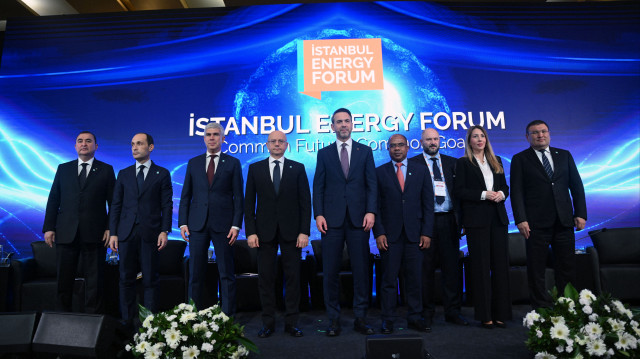

File photo
Forum organized by Anadolu under auspices of Energy and Natural Resources Ministry
By Sibel Morrow, Gulsen Cagatay, Handan Kazanci, Basak Erkalan
ISTANBUL (AA) - Energy ministers gathered at the İstanbul Energy Forum to discuss a range of topics, including energy source diversification and renewable energy, sharing details on investments and initiatives in their respective countries.
The event, organized by Anadolu under the auspices of the Energy and Natural Resources Ministry, focused on the theme, Common Future, Common Goals, aiming to bring global energy leaders together to address shared challenges.
- Moldova: “Major investments in energy infrastructure”
Moldova's Energy Minister Victor Parlicov said his country is preparing to make significant investments in its energy system, including new cross-border electricity links and renewable energy projects, as part of efforts to modernize its aging infrastructure.
“Although we are a small country, the amount of investments we are making in our energy system over the next several years will likely exceed everything that has been done in the last few decades,” Parlicov said.
He outlined plans to build three high-voltage lines, two of which will be new interconnections with Romania. The third is an internal line that will connect the capital Chisinau to the existing interconnection with Romania.
Moldova is also modernizing its district heating systems with hundreds of millions of euros allocated for the initiative, as well as holding renewable energy auctions to add 105 megawatts of wind power and 60 megawatts of solar capacity.
Parlicov emphasized the importance of energy efficiency, arguing that efficiency upgrades could save as much energy as the country's entire natural gas imports. He also highlighted Moldova's focus on electrifying vehicles, saying the existing transmission network is well-suited for this transition.
- Libya: “Renewable energy to boost gas exports”
Libyan Oil and Gas Minister Khalifa Abdulsadek said Libya is prioritizing renewable energy, particularly solar, with plans to generate an initial 500 megawatts and potentially expand further to attract investment and supply Europe.
He said the shift would enable Libya to redirect natural gas to the European market, leveraging high demand.
“We have the resources, and we believe that gas, which we are currently using to generate power, is a valuable commodity that can be exported to the premium market in Europe,” Abdulsadek said.
- Bulgaria: “Türkiye is a geographical energy bridge”
Bulgaria's Energy Minister Vladimir Malinov highlighted Türkiye's role as a geographical bridge allowing renewable energy to flow into Europe. He said Türkiye has made significant investments over the past decade in infrastructure to import additional liquefied natural gas (LNG), as well as natural gas from the Caspian region, including Azerbaijan.
Malinov stressed the importance of a balanced energy system, incorporating both renewable and fossil fuels, to ensure sustainability.
- Uzbekistan: “Reforms to attract foreign investments”
Uzbek Energy Minister Jurabek Mirzamahmudov said Uzbekistan has launched reforms to attract foreign investments, highlighting the country's political stability as a key factor.
By the end of the year, the Central Asian country plans to achieve over 4 gigawatts of renewable energy capacity, with a target of reaching 20 gigawatts by 2030, representing 40% of the country's energy mix.
- Azerbaijan: “Moving toward electrification”
Azerbaijan's Energy Minister Parviz Shahbazov said his country has several interconnectors to Türkiye, Europe, and the Caspian Sea region. He emphasized that these initiatives are critical for the global energy transition, making it “quicker and smarter.” He added that the world is moving toward electrification and renewable energy adoption.
- Georgia: “Energy as the backbone of economic growth”
Georgian First Vice Prime Minister and Economy and Sustainable Development MInister Levan Davitashvili described the energy sector as the backbone of Georgia's economic growth. He highlighted the importance of utilizing the country's energy potential and making the investment process in the energy sector easier for investors.
He added that Georgia has introduced a new contract scheme, similar to those in the European Union, offering a 15-year price guarantee, which is crucial for renewable energy project financing.
#İstanbul Energy Forum
#Khalifa Abdulsadek
#Victor Parlicov
#Vladimir Malinov
